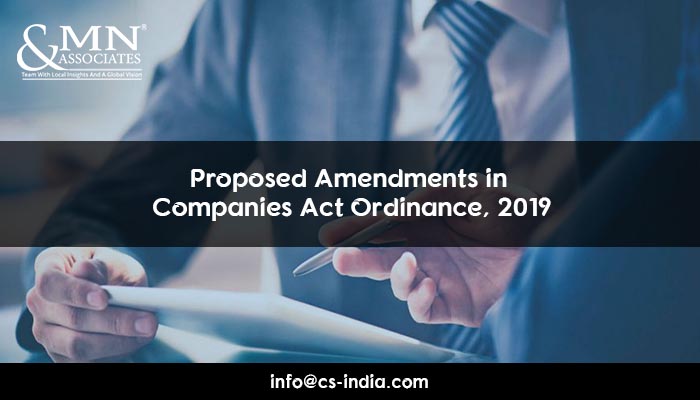
Proposed Amendments in Companies Act Ordinance, 2019
To bring improvements in the Companies Act, 2013 through a documented ordinance, the government of India promulgated the Companies (Amendment)Ordinance, 2019 on 25th January 2019. The ordinance till date holds a positive consent from the Lok Sabha and is yet to be presented in the Rajya Sabha for approval. Below is a section-wise summary of the suggested recommendations which has been placed for further refinement of the act :
– Section 2(41): Shift of Authorization from Tribunal to the Central government for approval of applications made by companies for ‘adopting a different financial year’ has been proposed. As per the existing provisions, the Tribunal holds the right to approve such applications.
– Section 10A: Suggestions have been put for filling of a necessary declaration by every company formed with share capital in a prescribed form to ROC specifying :
*details of receipt of the paid-up value of capital from subscribers.
*prescribed returns furnished for verification of registered office to the registrar.
This is to be filed before the company exercises any borrowing power and within 180 days from the date of incorporation. While non-compliance to above can even pose the registrar to strike off the name of the company from records.
– Section 12: Further, grant of powers to ROC has been proposed to even strike off company name from records, if any default found while holding a physical verification of the registered office of the company. This has been done to assure business is being carried out by the company and is not in mere papers only.
– Section 14: Shifting of authority from Tribunal to Central Government has been proposed, to grant approval for Alteration of articles in future, if the company requests for conversion- from a public company to private company.
– Section 53(3): To change the present penal provision of a section and levy a penalty of an amount equal to the amount raised by the issue of shares at a discount or Rs 5,00,000 whichever is less. The existing provisions say for levy of Rs 1,00,000 or Rs 5,00,000 whichever is less . Further, the company will also have to refund the deposited money back to the subscriber with a penalty interest of 12%.
– Section 64 (1): To amend the existing provisions of section and levy a penalty of Rs 1000/- for each day the default continues or Rs 5 lakh whichever is less.
– Section 77: Registration of the charges created have to be done within 30 days of creation such charge. After approval of the ordinance, this period can only be extended to 60 days by ROC too after submission of an application and payment of a prescribed fee. The ordinance proposes for a reduction of the extension period to 60 days which is 270 days in the existing provisions.
– Section 86 Penal provisions stated in Section 447 to become applicable for non-filing or filling of false or incorrect of information under registration of charges provisions stated above.
– Section 87: To assure rectification of any omission or misstatement of any particulars previously filed to Registrar with respect to any charge or modification thereof or with respect to any memorandum of satisfaction.
– Section 90: States for filling of an application for relaxation or removal of restrictions imposed by Tribunal on any relevant shares of the company. On approval of the ordinance, the company would have to file such application within 1 year of imposition of such restrictions. Failure in above will mandatorily command for transfer of such shares to IEPF.
Also, any person holding a beneficial interest in the company for at least 10 %, who is not registered as a member or as a holder of such shares has to declare his interest by making a declaration to ROC. Non-disclosure of which might attract a prescribed penalty or even imprisonment.
– Section 164: Restrictions to be placed on directors, to hold directorship in not more than 20 companies, including 10 public companies in it. Non – compliance to such will trigger immediate disqualification of the director found in default.
– Section 121: Mandates for filing report of Annual general meeting to ROC. For non-disclosure, it also states for levy of penalty of Rs 1,00,000 for first default or Rs 500 per day up to a maximum of Rs 5,00,000 in case of continuing default made.
– Section 248: To provide power to the registrar to remove the name of the company from records for breach of provisions stated in Section 10A and 12(9) stated above.
– Section 441: An increase in the limit of compounding offenses has been proposed from 5 lakh to 25 lakhs.
– Section 454A: Provisions of double penalty has been stated in the case of repeated defaults made by companies or by any person (member) of the company. While the default is to be made within 3 years of order imposed as a penalty for last default.
Some additional recommendations in the ordinance have been also proposed for a change of charge from fines to penalties.
To conclude, the above recommendations have been placed to bring more stiffness to the penal provisions and curb civil defaults by companies. Overall the recommendations have been welcomed by the House of people and only requires approval from the Council of states.
